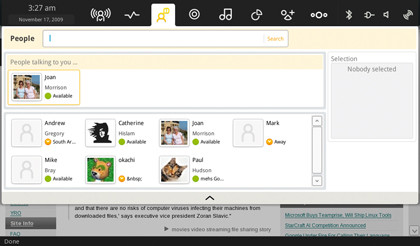Linux on the move: the future of portable distros
What to expect from Moblin, Android, Chrome OS and more
The future's bright. The future's shiny. The future is Chrome
With the 2.1 release of Moblin, many mainstream distributions have started looking at creating their own versions of Moblin and making these as their netbook contribution. The first distribution we've seen to make the leap to Moblin inclusion was Mandriva.
Its 2010 release packages the full Moblin environment alongside the usual fayre of Gnome and KDE. Installation is as simple as searching for the task-moblin metapackage and installing the result.

From what we've seen of it, Mandriva's Moblin differs very little from the standard version. Both the themes and the default package selection are identical.
But you do have the enormous advantage of being to install other Mandriva packages on your netbook, even if they're not going to be able to use the Clutter features of Moblin or look like typical Moblin applications.
Hot on the heels of the Mandriva release, the Fedora team has also been able to integrate Moblin into its latest release – Fedora 12. This is something of a return to its roots for the Moblin project, as it was initially based on Fedora distribution.
It also means that there should be better integration between the original Moblin packages and any new ones offered by Fedora, as both distributions are closely matched and inherit some of the same configuration files and layout.
Sign up for breaking news, reviews, opinion, top tech deals, and more.
Not to be outdone, OpenSUSE is also bundling Moblin into its main distribution tree, and there are community packages you can install for the last couple of releases. But rather than make it available for general consumption, Novell would rather sell its Moblin integration to netbook manufacturers directly.
Even more Ubuntu
As UNR is built on Ubuntu, it's highly likely that we'll see almost as many UNR respins as we have for the parent distribution. We've already seen one example in Jolicloud, and we'd put money on many community distributions, such as Linux Mint or Crunchbang offering a UNR overhaul alongside their standard desktop installations.
It's also likely that Canonical will be able to forge stronger relationships with companies like Dell, which is already shipping a specific version of UNR on its Mini 9 platform. As Windows XP is phased out and the cost of bundling Windows 7 rises, manufacturers will be looking for a cheap and easily maintainable netbook OS, and UNR fits the bill admirably.
Chrome OS
Google Chrome OS is Google's long-promised netbook distribution, which is being designed as the perfect platform for Google's growing library of online applications and services. Its release was described by Google Software Engineer Martin Bligh as a foundation rather than a fully functional operating system, and the plan is to have it ready for this time next year.
Chrome OS currently includes user interface experiments and some initial designs for ongoing development. The official blog describes these components as a sketch that will be coloured in over the next year.
To all of us here at LXF though, it's just the Chrome web browser running in full-screen mode. That said, there are some features that Google obviously wants to emphasise.
There will be no conventional desktop applications, with all facilities provided through the Chrome browser. Security has also been a big issue: each session will run as a sandbox, isolated from all other sessions. .
But the most important feature is speed. Google claims that its operating system will take you from boot to login in seven seconds, which gives Moblin and UNR something to think about, especially if that includes wireless initialisation. It could also be the reason why Google intends to ship its OS on specific devices, and not make it available for general consumption.
However it turns out though, you don't need a time machine to know that when Google takes a project like this seriously there are going to be serious implications and exposure for Linux.